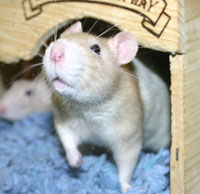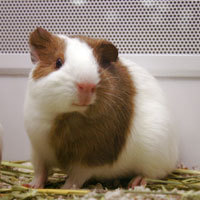Seasoned small animal owners tend to bicker over the smallest of details when it comes to the care of their pet. From food to free time, no one seems to agree on just one thing. When it comes to bedding though, there seems to be an all out war over which is best. As a small pet owner, I’ve used just about every variety of bedding on the market, and even I get confused sometimes. One will claim to have the best odor control, but it’s really dusty. Another will be softer and cuddlier for your pet sleep in, but it smells bad even when it’s clean. There is no perfect small animal bedding…but, there is probably be one that is best for your particular situation. There are pros and cons to all the small animal bedding types available. Here’s my break down on what to expect from the most popular types available. Read More »
Category Archives: Chinchillas
Feed SubscriptionPets as Presents – Things to Do Before You Adopt an Animal as a Gift
 The holidays are approaching and its time to go shopping! Around this time of year people come to That Fish Place – That Pet Place to begin scoping out pet possibilities for their kids. Nothing would please a little boy or girl more than to open up a box on Christmas morning to find that Santa has left them a real live animal for being so good all year! But what Santa (and parents!) need to remember is that an animal should be treated differently than most presents. Here is a checklist I’ve composed for prospective live gift givers to review before presenting a pet as a gift.
The holidays are approaching and its time to go shopping! Around this time of year people come to That Fish Place – That Pet Place to begin scoping out pet possibilities for their kids. Nothing would please a little boy or girl more than to open up a box on Christmas morning to find that Santa has left them a real live animal for being so good all year! But what Santa (and parents!) need to remember is that an animal should be treated differently than most presents. Here is a checklist I’ve composed for prospective live gift givers to review before presenting a pet as a gift.
Is it OK with Mom and Dad?
Countless times right after Easter and Christmas I see animals being returned or surrendered to us because “Aunt Shirley” decided it would be nice to present her nephew with a living surprise without checking to see if it was OK with his family first. Most of the time, this happens because Mom and Dad simply were not ready or willing to take care of an animal they hadn’t been expecting. Although Aunt Shirley meant well, she should have discussed it with her nephew’s parents to make sure they also wanted a new pet to feed and care for in their house. Doing this would have spared everyone a lot of heartaches and headaches!
Have you done your research?
Never buy an animal on a whim and expect its young owner to know just what to do. Read, go online, and talk to employees at the pet store to make sure you are picking the right animal for your child and that you will be able to give it everything it needs to be happy and healthy.
Will the child be able to properly care for this animal?
 Very young children may promise they will do all the work, but let’s face it; the job usually falls to Mom or Dad. Make sure the child will take an active role in the care of their pet before giving them one for Christmas, and make sure Mom and Dad won’t mind picking up the slack.
Very young children may promise they will do all the work, but let’s face it; the job usually falls to Mom or Dad. Make sure the child will take an active role in the care of their pet before giving them one for Christmas, and make sure Mom and Dad won’t mind picking up the slack.
Do you have a plan for the animal before Christmas Day?
Animals cannot be kept in the box they came home in from the pet store all night long. Most of them will chew their way out before morning or their urine will possibly burn a hole through the box or cause them to get respiratory problems from breathing in the fumes all night. If you decide to pick up the animal on Christmas Eve or sooner, make sure you have a cage or a temporary set-up complete with food, water, and shelter until Christmas morning.
Did you put holes in the box?
This may seem obvious, but I have heard painful stories of animals being found suffocated after only a few minutes in an airtight box. If you are going to wrap the cage or box with the animal in it at the last minute before the child wakes up Christmas morning, be sure there are breathing holes in the box.
Do you have all the supplies ready along with the new pet?
Nothing is worse than opening up a new toy and realizing there are no batteries included with it. The same goes for a new pet. What good is your pet gerbil if you can’t put him in his new cage and watch him play right away! Be prepared to gift a cage, accessories, food, and bedding along with the new pet.
Do you have a “Safe Zone” for the new pet?
Holidays are hectic stressful times for pets and people alike, and it will be much worse for a brand new animal in a brand new home. Once the excitement has worn down over the opening of the live gift, place the animal in its cage and move it to a “safe zone” — a quiet room where friends, relatives, and other pets will not be able to bother it. It may be tempting for your child to parade around showing Grandma and Grandpa the new bunny she’s gotten, but for the bunny, this is a very scary experience! The best way to make a good impression on a new pet is to respect its boundaries and give it time to adjust to a new home. Save show-and-tell for another day, when the animal has had more time to adjust to his new home.
Have you considered gifting the supplies first?
Since the holidays are so hectic, it’s a good idea to buy the cage and accessories first and have your child open these on Christmas morning instead of a box with a live animal in it. First of all, this will keep things from getting too crazy what with setting up the animal in its cage and keeping intrigued relatives at bay. Second of all, this will extend the excitement for the child because now she has a chance to pick out her new animal and can look forward to going to the pet store the next day to get her REAL gift! And then she gets to pick out what she likes best without you having to guess which color or personality type she would prefer beforehand.
Will you commit to the gift?
This happens more with rabbits and chicks over Easter, but I’ve seen it happen with other animals at Christmas too. Sometimes families believe it is okay to get their son or daughter a baby animal to raise for a while with plans to get rid of it as soon as it is older or the weather gets nice. I have a big problem with this! First of all, you cannot always guarantee to find a home for your adult animal when you are ready to get rid of it and sadly, this sometimes results in animals being released into the wild or dumped on a farm somewhere. Secondly, this is teaching children that once something becomes too big, old, or expensive to care for, it is okay to abandon it. Owning a pet throughout its entire life is an educational and enriching experience that will help children learn about life and responsibility. If you plan on getting your kids a pet for Christmas, be prepared to care for that animal until the day it dies. Pets need proper housing, food, and veterinary care, and if you ever find yourself in a predicament that makes it impossible to continue providing these things for your animal make sure you have a suitable plan to re-home that animal with someone who can. Pets are not temporary. They are for life.
With all this in mind, try to enjoy preparing to bring a new pet into the family at Christmas time. Planning ahead will make things much easier, and it can be a warming experience to see that look in your child’s eye one he or she realizes you finally said yes to that pet they’ve been wanting so bad! Adding a new member to the family is a wonderful experience if done properly, so be smart, be safe, and always keep the animal’s best interests in mind. Happy Holidays!
Common Small Animal Myths – Debunking Bad Publicity – Part 2
Now onto some interesting things I’ve heard about some smaller pets.
Guinea Pig Gossip
I’ve actually heard people say that a guinea pig’s eyes will fall off out you pick him up by the tail.
This ridiculous myth has been around for decades. I have no idea where it came from, but I can debunk it with one simple fact….guinea pigs don’t have tails!
The idea that Guinea pigs can live with rabbits is a common bit of misinformation. Read More »
Common Small Animal Myths – Debunking Bad Publicity – Part 1
Having worked at That Fish Place’s Small Animal Room for nearly 6 years, I’ve heard many a misconception from customers. Most of this I attribute to the grape vine effect. One person has a bad experience with a pet, tells someone else about it, and then that story gets embellished or added upon over time, until it becomes a completely fictional story. Today, I’d like to debunk some of the more commonly heard myths I’ve heard over the years. Read More »
Choosing the Perfect Small Pet – Take the Quiz
 Sometimes it is hard to find the perfect pet. They all look so cute sleeping in their hammocks, running in their wheels, or just snuggling with pals. So which critter should you take home from the pet store? The questions in this short fun quiz should help give you an idea of your small pet personality match, but remember to do additional research before making the final decision! You’ll find the best pets to suit your lifestyle in the answers section below.
Sometimes it is hard to find the perfect pet. They all look so cute sleeping in their hammocks, running in their wheels, or just snuggling with pals. So which critter should you take home from the pet store? The questions in this short fun quiz should help give you an idea of your small pet personality match, but remember to do additional research before making the final decision! You’ll find the best pets to suit your lifestyle in the answers section below.
1.) During my days off, you can often find me ____.
a.) Hanging out at home – whether it’s to finish the laundry or catch up on all my recorded shows!
b.) Away on a mini vacation with the family. See you Monday!
c.) Having a bunch of friends over for a cook-out. The more the merrier!
2.) How much time do I want to spend grooming my pet?
a.) As little time as possible
b.) I don’t mind a little brushing here and there
c.) I could start my own pet salon with the time I will spend grooming!
3.) How many animals do I want?
a.) Just one will do
b.) A pair of pals
c.) A whole family!
4.) I will get around to cleaning my pet’s cage ____ times a week.
a.) 1-2
b.) 2-3
c.) 5-7
5.) I prefer to _____ my pet!
a.) Cuddle with
b.) Play with
c.) Just watch
d.) Do a little of everything
 Answers
Answers
Question 1
a.) If you’re home a lot, you can spend a lot of time playing with or just watching your pets play outside the confines of their cages. Think about ferrets, guinea pigs, rabbits, or rats. These animals love interacting with their owners!
b.) If you prefer to spend as much time away from home as possible, a highly social or active animal may not be a good choice. Think about hamsters, gerbils, or chinchillas. These little guys do well without a lot of handling, but always be sure there is plenty of food and water.
c.) Have a big family or like to have lots of parties? Think about animals that are not bothered by a lot of noise and are not spooked by kids and strangers. The social ferret will want to join in the festivities while sensitive critters like rabbits and guinea pigs won’t appreciate a lot of ruckus! Then again, keeping the pet’s cage in a private room where guests or unattended children will not be entering works well for any small pet.
Question 2
a.) Hamsters, gerbils, rats, and mice are very good at keeping themselves clean, so you will not need to brush or bathe them. They also generally will not need their nails clipped since they spend a lot of time wearing them down by digging. You can, however, offer a dust bath once and a while to hamsters and gerbils now and then!
b.) If you don’t mind the occasional grooming session, most short haired rabbits and guinea pigs will need to be brushed once a week or so to remove dead hair and knots. However, if your breed of guinea pig or rabbit has long hair, you will need to do this more often. Chinchillas need no more than a roll in the dust once or twice a week to keep clean. Rabbits and guinea pigs usually need a nail trimming once a month.
c.) If you love nothing more than pampering your pet, a long haired breed of guinea pig or rabbit will require daily brushing to keep knots from building up as well as monthly nail trimming. Ferrets will need to have their ears cleaned and nails clipped once every two weeks, and can be bathed once a month if their body oil buildup becomes too smelly to handle.
Question 3
a.) Animals that do well housed alone include hamsters, chinchillas, and rabbits, but remember they will still need attention from you and plenty of toys and activities to keep busy.
b.) Chinchillas, gerbils, mice, rabbits, and guinea pigs do well in pairs but remember to get two of the same sex animal or have your animals spayed or neutered before introducing them to prevent unwanted litters. It is usually a good idea to buy pairs of animals at the same time so they can grow up already accustomed to each other.
c.) Gerbils love company! In the wild they live in small groups dominated by one female. If you opt for gerbils, think about getting males as they do not fight for dominance as much as females do. Guinea pigs also live in groups, but females tend to get along better than males do. Rabbits in the wild will live in groups until the breeding season, when the males will fight for mating rights and the females will fight for nesting areas. If you keep bunnies, be sure to spay and neuter them to eliminate these behaviors. Rats and mice live in huge colonies together in the wild, and as long as there is ample food and space, should get along well in groups at home.
 Question 4
Question 4
a.) Small rodents, like hamsters, mice, gerbils, and rats are clean and generally do not need to have their cage totally cleaned more than once or twice a week. Remember, the more animals you keep, the more they will need their cage cleaned.
b.) Guinea pigs, rabbits, and chinchillas have constantly moving digestive systems, so you can imagine the amount of poop they make in a week! If you scoop or dump their cage pans every few days and scrub the entire thing once a week, smells and bacteria will not take over your life.
c.) Ferrets are known for being messy, and they poop a LOT. Once you get them trained, their litter pans will need to be cleaned every day or every other day and the toys, towels, and hammocks will need thrown in the laundry or the smell from their body oils will build up. Along with their grooming, if you keep up on this chore it will become a trivial task, but put it off for too long and P.U.! No one wants to spend all day scrubbing cages. If you are diligent, you won’t have to!
Question 5
a.) You can’t get any cuddlier than a rabbit or guinea pig!
b.) Ferrets and rats will go crazy for playtime…literally!
c.) Hamsters, mice, chinchillas and gerbils can entertain themselves while you watch.
d.) There is a fourth category reserved here just for….everybody! Most animals will benefit from a bit of cuddling, a bit of playtime, and a bit of just being left alone, and it will depend on the personality of your individual animal. Remember that no animal perfectly fits the mold for what the general temperament is for its species. I’ve seen social hamsters and shy ferrets. I’ve seen solitary gerbils and mellow guinea pigs. Try out all of the above activities with your pet and see what he or she prefers. Read your pet’s body language and act accordingly, and do not be offended if your normally cuddly rabbit decides he doesn’t want to be picked up today. Just watch him for now. If your ferret is all tuckered out from playing, engage in a cuddle session! Whatever pet you choose, if you respect his or her boundaries, the relationship between you will flourish!
Small Pets for Your Children – Choosing His or Her First Pet – Part 2
So, in Part 1 of this article we covered a couple of the small pets that may be considered when you’re looking for your child’s first pet. Welcome back for Part two where we’ll move on to some slightly larger animals that may also be considered. Read More »
 That Pet Blog That Pet Place Pet Blog
That Pet Blog That Pet Place Pet Blog
